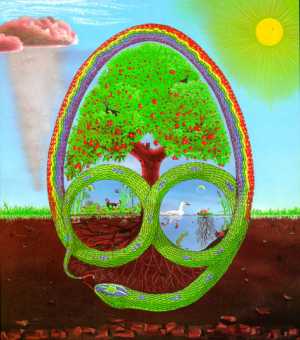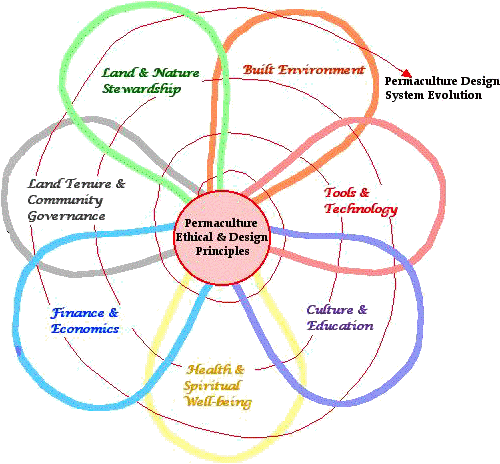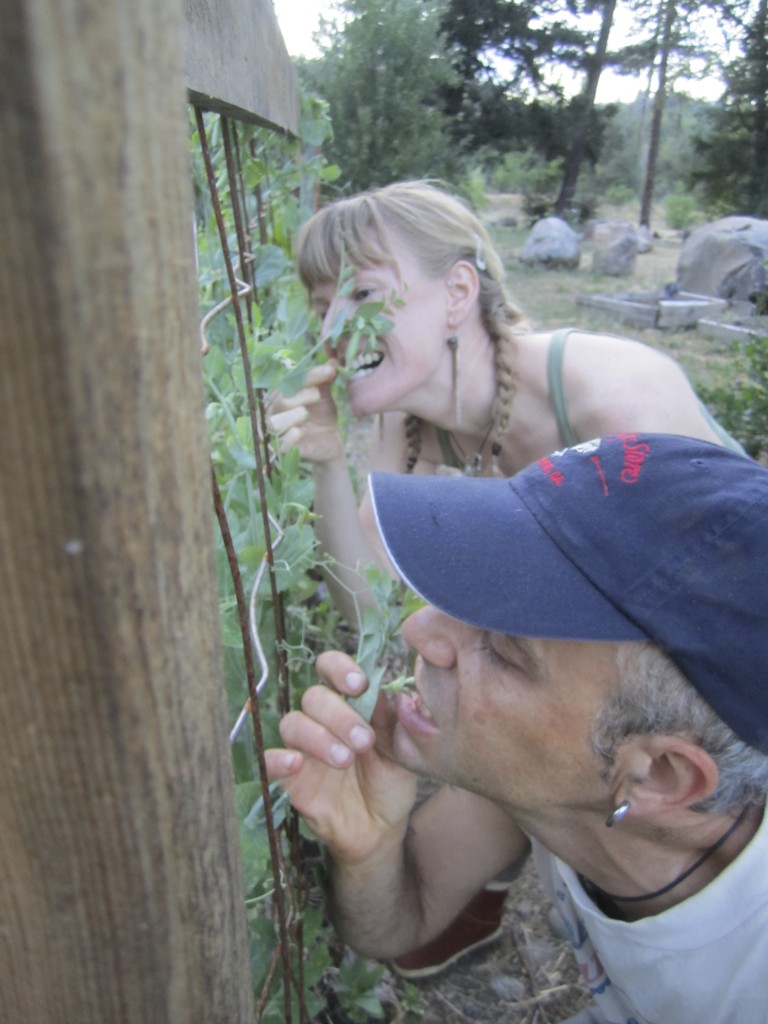Permaculture is a powerful and evolving integrated design science, grounded in an holistic ecological and social consciousness, which we believe has the potential to heal this world. Though drawing from many traditional techniques the world over, Permaculture, as its practiced and approached today, was popularized (starting in the 1970s) by several pioneering “permies” including Bill Mollison, David Holmgren, and Sep Holtzer.
Starting with a set of base principles, patterns and paradigms, Permaculture has today grown into a wide and expanding body of knowledge and methods encompassing sustainable and regenerative models for agriculture, forestry, housing, economy, management and more!
All over the world today, there are organization offering certifications known as Permaculture Design Certifications, which imparts a mature and consistent curriculum qualifying graduates to be Permaculture Designers. On all scales, many thousands of sites for food forests, living spaces and more have been designed and developed through the work of these graduates.
Here are some web resources for anyone interested in learning more about this important and fascinating subject.
- The Wikipedia has a reasonably good introduction to the subject on its Permaculture page
- Permies.com has the largest and most active set of forums about permaculture on the internet.
- The BBHSP Permaculture Design Certification training was produced by an organization called Living Mandala, based in California, who are active in organizing excellent trainings and other events, as well as doing consulting and design work.
If you are interested in pursuing a permaculture education, searching the internet will readily yield some educators in your area. As the BBHSP gardens, orchards, land forms, and natural buildings develop and evolve, we will be creating more opportunities, events, classes, and workshops for educating the public about permaculture.
In the summer of 2010, BBHSP hosted a 17 day Permaculture Design Certification Course, with a focus on InterGenerational Ecovillage Development. Instructors included some of the best teachers in the field: Penny Livingston-Stark, Rick Valley, Marisha Aurebach, Jay Ma, Greg Landua, John Valenzuela, Max Meyers, Jon Young, and several others.
Topics covered included: Permaculture Design, Permaculture Principles, Natural Pattern Recognition, Nature Awareness, Reading the Landscape, Pattern Design & Biomimicry, Bird Language, Maps & Mapping, Designer Tools, Design Process & Methods, Zones & Sectors, Site Analysis, Urban Permaculture, Social Permaculture, Invisible Structures, Tropical, Arid & Cool Climates, Whole Systems Design, Design Projects, Hands-On Activities, Sustainable Systems, Water Cycles, Water on the Landscape, Earthworks & Pond Building, Soil Food Web, Soil Ecology & Soil Building, Forest Ecology, Plants & Home Gardens, Agroforestry & Food Forests, Rain Harvesting & Catchment, Natural Building, Renewable Energy, Appropriate Technology, Humanure, Fungi & Myco-Remediation, Integrated Animal Systems, Aquaculture & Aquaponics, Wildcrafting, Ecovillage Design & Community Building, Village Scale Design, Land Access & Legalities, Regenerative Real Estate, Community Governance, Democratic Decision Making, Compassionate Communication, Cultural Mentoring, Group Process & Facilitation, Community Building, Transition Towns, Ecovillage Design Charettes, Education, Cooperatives & Non-Profits, Intentional Communities, Green Business, Green Economics, Alternative Currencies, Bio-Regionalism, Indigenous Wisdom, Personal Renewal, Health & Healing, Holistic Nutrition, Yoga & Embodiment Practices, Inner Ecology, Improvisation, Ritual & Ceremony, Personal Empowerment, Rites of Passage, Deep Ecology, Music & Song, Story Telling, Hot Springs Soaking…
Instructors, Facilitators & Guests:
Penny Livingston-Stark, Director & Founder Regenerative Design Institute, Veteran Instructor

Penny Livingston-Stark is internationally recognized as a prominent permaculture teacher, designer, and speaker. She is the founder of: Sustainable Living Designs (SLD) – a professional permaculture design/build firm integrating landscapes and structures with water, soil, plants and energy efficiency; The Permaculture Institute of Northern California (PINC) – an educational and research organization promoting sustainable technologies and methodologies; andRegenerative Design Institute (RDI) – a non-profit education program focusing on hands-on skills development. Penny has been working professionally in the land management and development field for 25 years and has extensive experience in all phases of ecologically sound landscape design and construction as well as the use of natural non-toxic building materials. She specializes in site planning & design of resource-rich landscapes, integrating rainwater collection, edible landscaping, pond and water systems, habitat development and watershed restoration for homes, co-housing communities, businesses and diverse-yield perennial farms. Penny is currently on the board of the Solar Living Institute in Hopland, California and has served on the Redwood Empire Chapter of the Green Building Council. She co-created the Ecological Design Program and its curriculum at the San Francisco Institute of Architecture and co-founded the West Marin Grower’s Group, West Marin Farmer’s Market, and the Community Land Trust Association of Marin.
Rick Valley, Veteran Instructor
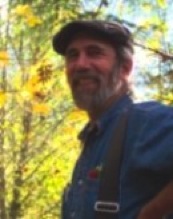
Rick has been practicing Permaculture, Forest Gardening and Sustainable Forestry in the foothills of the Cascades for more than 17 years and carries the expertise of a master nurseryman form one of his previous incarnations as the owner of a nursery business. From an interest in new crops and ethnobotany, Rick began his study in Permaculture starting at a bamboo nursery in 1981. He took his first Permaculture Design Certification course with Bill Mollison in 1986 and began teaching with the first Permaculture Design Certification courses in Canada offered at Linnea Farm, Cortes Island, BC. Rick taught regularly with the Linnea Farm Community for 10 years, co-taught the first permaculture design courses in Canada, Oregon and Belize, and introduced Permaculture to the Lost Valley Ecovillage & Educational Center in Dexter Oregon, where he began teaching in 1990. Rick moved from Portland, OR to the S. Willamette Valley in 1997, and has been the primary land steward and lead permaculture instructor at Lost Valley since 2004. His special interests in Permaculture include hands-on education, tree crops, earthwork for water harvesting, and broadscale design for farms and communities. Rick holds a BA in anthropology from Antioch College, an MA in teaching from Reed College, and a diploma in Permaculture Design in teaching and site implementation from the Permaculture Institute of Australia.
Marisha Auerbach, Instructor, Facilitator
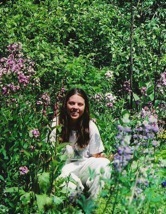
Marisha Auerbach has been practicing, studying, and teaching permaculture in the Pacific Northwest for the past decade. She is involved with many communities around Cascadia including Lost Valley, Tryon Life Community Farm, and City Repair. As an itinerant permaculture designer, Marisha calls the greater Olympia area home, especially the Wild Thyme Farm, a 150 acre permaculture demonstration farm and FSC certified forest in the northern Willapa Hills. Marisha encourages sustainable futures through sharing knowledge with others on a variety of topics including: permaculture, polyculture gardening, seed saving, flower and gem essences, local economics, community building, ethnobotany, herbalism, edible landscape design, and organic gardening among others. She is enthusiastic about creating perennial forage systems and building local community. Marisha’s interest in local economics and creating useful items using her resources has manifested as several projects: past work on local community marketplaces in Olympia, Queen Bee Flower and Gem Essences, Herb’n Wisdom for permaculture consulting and herbal products, and Growing Greetings which produces plantable greeting cards and other products. Marisha has a small plant nursery which focuses on edible flowers and other gourmet specialty food items. Marisha graduated from the Evergreen State College in 1998 where she focused on ethnobotany, ecological agriculture, and sustainability studies. She continues to interact with students from the Evergreen State College by offering internships.
Jay Ma, Instructor, Facilitator
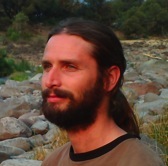
Jay Ma is a permaculture designer, facilitator, and community organizer committed to cultural healing through Peacemaker Principles. He received his first permaculture design certification through Naropa University in 2001, a B.A. through New College of California in Culture, Ecology, and Sustainable Community with a concentration in Eco-Dwelling/Natural Building, and is a graduate of the pioneering two-year training intensive in Regenerative Design & Nature Awareness. Jay has developed educational programs, retreats, workshops, and events as well as community land development projects with organizations including the Regenerative Design Institute, the Institute of Noetic Sciences, Earth Circle, Gaia University and others. He is currently an associate with Gaia University in Organized Learning for Eco-Social Regeneration, working on organizing educational courses in the Pacific Northwest and beyond. Jay is also a certified Permaculture Teacher, a Fire Walk Instructor through Sundoor International, and is passionate about renewing Rites of Passage experiential programs for people of all ages.
Greg Landua, Eco-Village Training Center Program Coordinator, Instructor, Facilitator

Greg Landua has studied marine and terrestrial ecology and evolutionary biology in the Galapagos Islands, translated for Amazonian rainforest guides, fought wildfires in the wilderness of Alaska, and studied the nuances of ecology and ethics. Greg has B.S. in Environmental Science and Ethics from Oregon State University, and is receiving a graduate diploma in Organizing Learning for Ecosocial Regeneration from Gaia University. He is currently the Program Coordinator for the Ecovillage Training Center on The Farm in Summertown, Tennessee. He is an active permaculture and ecovillage design educator, founding partner of the Nemawashi Partnership, and core member of the Living Mandala Design Collective. Along with teaching and practicing permaculture, Greg is an active bioregional organizer and NextGEN fellow helping to craft avenues and pathways for intergenerational dialog and collaboration in the shared enterprise of earth regeneration. Greg is also a member of the coordination team for the 10th Continental Bioregional Congress, and author of the blog Gaia Emerging which explores regenerative solutions for the well being of our planet.
Jon Young, Guest Instructor
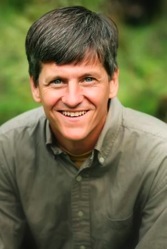
Jon Young grew up in Monmouth County, New Jersey, and was mentored from from the age of 10 as a naturalist, tracker, survivalist, and mentor in a Native American tradition by the tracker and author Tom Brown, Jr. He received his BS in Environmental Science in 1983 from Cook College, Rutgers University, with particular emphasis on natural history and anthropology and a focus on how native cultures helped their children understand and connect with the natural world. From 1984 to 1994, Jon was mentored as naturalist, tracker, cultural specialist and mentor by the African Akamba elder Ingwe. Inspired by his mentoring with Tom Brown, Jr., fueled by his studies in natural history and anthropology, and guided by the elder Ingwe, Jon has pioneered blending Native mentoring and cultural techniques from around the world with a broad array of tools for connecting with nature, and developing refined and holistic tracking skills. Jon co-founded theWilderness Awareness School with the support of the honored elder Ingwe in 1983, and has created several popular training tape series, including being the principal author of both The Kamana Naturalist Training Program and The North American Master Shikari Sequence forCyberTracker. Out of the Wilderness Awareness School, Jon developed a system that is now called “8 Shields Cultural Mentoring”. This system tracks processes and mentoring techniques that are built into the design of one-on-one mentoring programs, family mentoring practices, community-based mentoring, and more traditional modes of education. The 8 Shields Cultural Mentoring model has now influenced well over 100 nature and eco-community programs in the United States, Canada and Europe, and is also used in his consulting for organizations, government agencies and communities worldwide. Jon has utilized the 8 Shields Cultural Mentoring model to develop and enhance community development for communities interested in working with peace-making as it relates to nature connection. This has evolved into a world-wide network of practicing communities. Jon has given over 1000 public presentations and has helped many PhD and Masters students as well as undergraduates with the completion of their degrees on topics ranging from native education to wildlife tracking. Jon is married and has six children, and truly wants his children and future grandchildren to experience the joy and benefits of living in a whole and healthy world and as part of a remarkable community of mentors! For more information on Jon Young visit www.jonyoung.org
Corinne McLaughlin, Guest Instructor
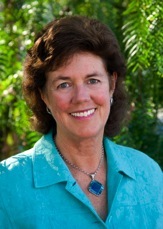
Corinne McLaughlin is co-author of The Practical Visionary, Spiritual Politics, and Builders of the Dawn and is co-founder of The Center for Visionary Leadership in California and North Carolina. She coordinated a national task force for President Clinton’s Council on Sustainable Development and is a Fellow of The World Business Academy and the Findhorn Foundation. She is also a co-founder of Sirius Community, a spiritual/environmental center in Massachusetts, and she taught politics at American University.
Gordon Davidson, Guest Instructor
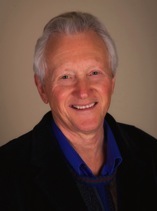
Gordon Davidson is President and co-founder of The Center for Visionary Leadership and co-author of Spiritual Politics (Foreword by the Dalai Lama) and Builders of the Dawn. Gordon served as the Executive Director of the Social Investment Forum and The Center for Environmentally Responsible Economies, and he is a Fellow of the World Business Academy and the Findhorn Foundation. He consults with many organizations, and offers personal coaching for leaders.
Chris Byrne, Guest Instructor
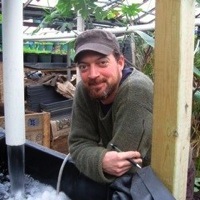
Max Meyers, Guest Instructor
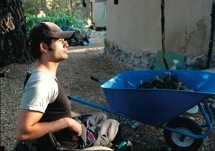
Maximillian Meyers is an Ecological Designer, Permaculture Teacher, Commercial Aquaponic System Designer/Installer, Rainwater and Greywater System specialist, Farmer and the Executive Director of the Mendocino Ecological Learning Center a nonprofit educational organization and ecological reserve offering green job training and sustainable living skills to the public free of charge. In addition to the work at MELC, Mr. Meyers provides Ecological design services to the public, organizations and schools through his businesses Osiris Designs and NorCal Aquaponics. He is passionate about all things related to a more just and sustainable world. He has been studying, practicing and teaching Permaculture and Ecological Design for 12 years. Since graduating from College with a B.A. degree in Culture, Ecology and Sustainable Communities, Max has become a certified Permaculture designer/teacher, water systems specialist and working professional. He has been fortunate enough to study with people like Bill Mollison, Geoff Lawton, Sepp Holzer, Tom Ward, Jude Hobbs, John Valenzuela, Penny Livingston, Tim Mann and many others in places like the United States, New Zealand, Australia, Thailand, Mexico, Colombia, Brazil and Hawaii. Some of his fields of study and practice include: Natural Building, Organic Farming, Integrated Rainwater Harvesting, Alternative Transportation, Mushroom Cultivation, Sustainable Forestry, Beekeeping, Animal Husbandry, Renewable Energy, Biogas Production and use, Greywater Systems design and installation, Vermiculture, seed saving and many other sustainable technologies, methods and skills. He has experience teaching Permaculture, Natural Building, Cob Construction, Renewable Energy, Organic Farming, Beekeeping and others. His work has been featured in the best selling book Gaia’s Garden, radio and television programs.
Leonard Barrett, Guest Instructor
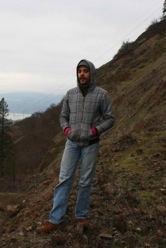
Leonard Barrett is a permaculture designer, consultant, and teacher based in Portland, Oregon. Leonard teaches at Pacific University in Forest Grove, OR and at other Permaculture Design Courses in the Pacific Northwest; writes for the Permaculture for Renters blog, and runs his permaculture design and consulting firm – Barrett Ecological Services. Leanord’s designs are featured in the #1 best selling permaculture book: Gaia’s Garden: A Homescale Guide to Permaculture by Toby Hemenway.
…And several other great teachers and facilitators!
Course Inspiration: In this era of great transformation, falling oil supply, and global warming – we are on the edge with an empowering ability to design our world to be the change we wish to see. A growing number of people are tiring of a life of disconnection from nature, from the monotony of corporate jobs, and from the inherent unsustainability of their lifestyles. From retiring baby boomers & business executives, to younger people disinterested in careers without true ecological and humanitarian ethics, to indigenous peoples, to people of third world countries… people from all walks of life are recognizing permaculture, green technologies, and sustainable communities as solutions to some of the most challenging problems facing humanity at this time.
People are not only seeking the practical solutions, tools, and skills they may need to adapt to these changing and uncertain times, but also are genuinely desiring to implement these technologies as a way of life. Imagine a world where humans live harmoniously and abundantly with the natural systems of the Earth… where food, medicinal, and useful plants grow everywhere … where adults, children and elders give their gifts fully & rejoice in celebration from the blessing of living in community in balance with Nature. This is the life of an ideal Permaculture Homestead or Ecovillage – whether in the county, city or somewhere in between.
Course Description:
We are excited to announce this first Holistic Permaculture Design Certification Course with a focus on InterGenerational Ecovillage Development. With a focus on tending the inner, outer, and community landscapes… this course will include the standard 72-hour permaculture design curriculum based upon the original Mollison and Holmgren ideas and design philosophies published in The Permaculture Designer’s Manual, as well as be a nourishing retreat and hands-on immersion experience in Ecovillage Design & Development.
In addition to the standard Permaculture Design Certification curriculum, we recognize permaculture as a holistic design philosophy expanding in symbiosis with many related fields. Accordingly, this permaculture design course will integrate additional content and activities such as nature awareness, indigenous wisdom, holistic nutrition, embodiment practices, inner work, group process, and much more.
During this intensive 17-day course participants will be immersed into an amazing and nourishing learning environment practicing skills to transform our lives and our communities into regenerative systems while contributing to the design & activation of an exciting Ecovillage project, living in community as a village, and experiencing profound personal renewal at this oasis of natural beauty and magic.

